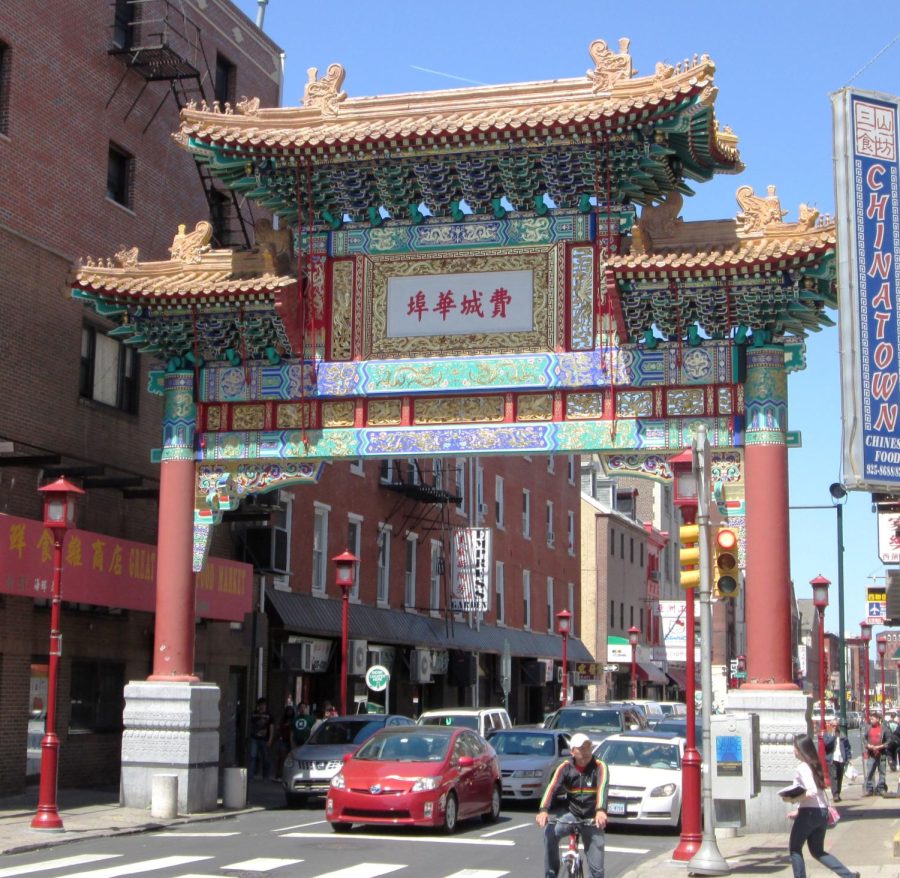Sixers proposed arena draws protests from Chinatown residents
The proposed new arena, which is set to be built in the middle of Chinatown, has drawn ire from different community groups
The Friendship Gate in Chinatown at Arch and 10th Street, blocks from the proposed arena
February 1, 2023
Over the holidays protests erupted throughout Chinatown against the 76ers proposed arena.
On Christmas day in December, a plethora of Chinatown residents took to the streets in protest against the 76er’s proposed $1.3 billion arena. The arena would take up Market Street between 10th and 11th street and close Filbert Street due to car traffic. The plan is to get zoning approval and commence construction by June 2023 with the intent of staying once their lease with the Wells Fargo Center is over in 2031. The proposal would replace the western part of the fashion district mall and congest the surrounding area with heavy traffic.
Both the CEO of the 76er’s Tad Brown and minority owner developer David Adelman claim, “It’s gonna be a living, breathing part of this community that’s hopefully going to be an epicenter of growth.”
From the surface it appears that the business is looking to have an agreed Community Benefit Agreement with the community’s representatives, a Community Benefit Agreement being a contract between the developer and community leaders asking the residents for cooperation in exchange for monetary benefits. Adelman claims that the Community Benefits Agreement could be valued well over $50 million including projects seeking to better Chinatown like public safety and affordable housing. The developer claims that developments are currently underway and that the response from community leaders has been productive but the outcry from residents suggests otherwise.
From the groups “No Arena In Chinatown Solidarity” to the “Save Chinatown Coalition” it’s clear that the people aren’t interested in what the arena has to offer. A week before protests, over 20 organizations dedicated to the community set a meeting to voice concerns over the arena where over 200 people attended with an estimated 100 people streaming. Many people from surrounding communities also joined in later on in protest against its construction.
“Though I am a huge Sixers fan…I understand both sides in this situation,” said sophomore and Sixers fan Aaron Rugby. “I understand that the Sixers may want to move to Chinatown in hopes to potentially bring more traffic or drive more attention to Chinatown, but I also understand that residents in Chinatown might not want to deal with all of the traffic and chaos that would occur there if the Sixers did move. Personally, as a Sixers fan who has been to many games, I think the arena setup on South Broad Street is cool with Wells Fargo Center, Citizens Bank Park, and Lincoln Financial Field all being right next to each other. There are not many places that are like that and I personally do not think that it should change. It makes [the team] unique.”
As home to 120 small businesses, one of the greater concerns is that the arena would kill off any revenue for those local groups. Although the arena would beckon a plethora of people, business owners argue that the crowds would only spend money within the stadium and congest the streets for no purpose.
This same concern came to fruition in Washington DC’s Chinatown back when the Capital One arena was constructed. With the sudden rise in property taxes many Chinese business owners were forced to relocate, the loss of these businesses forever altering the culture within DC’s Chinatown and leaving it susceptible to gentrification.
“It’s sort of like how biodiversity is really important to any environment,” activist and author Deborah Wei told WHYY in November. “[The arena] is erasing the biodiversity of what makes a city a city. And you’re not going to ever get it back. If you lose Chinatown, it’s gone…In 2000, we fought off a baseball stadium. In 2008, we did it again and fought off a casino. What the 76ers, Adelman, and the billionaires and city officials who came before them fail to recognize is that Chinatown will fight for its survival.”
Another group heavily involved in protest is the Jewish community as their connection to Chinatown dates back to the 1930s due to most restaurants advertising their food as Kosher, accommodating to Jewish dietary regulations. It is clear that the community is passionate about maintaining the integrity of their culture and preserving small businesses.
“This arena is going to destroy Chinatown as a community,” Chinatown resident Micheal Zhang told The Morning Call in December.
Last month, over 90 businesses signed a one-page petition stating that the arena would “destroy” Chinatown, according to WHYY. In response, a Sixers spokesperson said that the team will “continue to meet with community stakeholders to discuss the facts surrounding the proposed area and how it will positively impact” Chinatown. Many residents — and basketball fans — remain ambivalent about the plans for the team.







